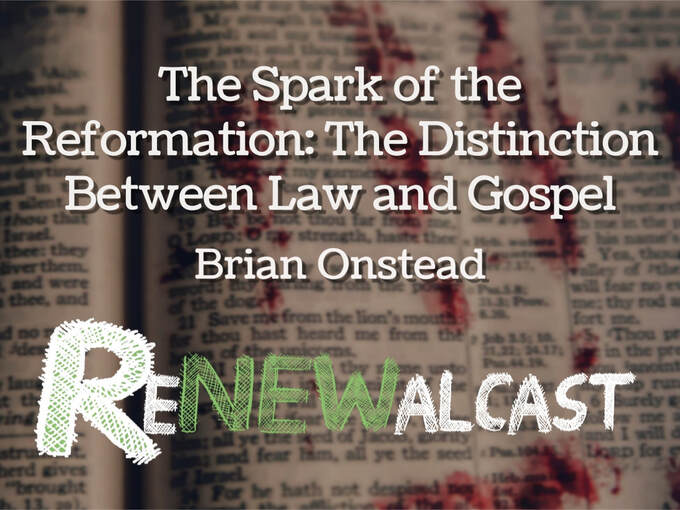 It is often said that John Wycliffe was the morning star of the Reformation because of his work in translating the Bible into English. The story goes that once the printing press was invented a couple of centuries later, everyone had access to the Bible in English, and upon reading the Bible everyone discovered the truth. As important as John Wycliffe’s work was, it is simply not true that everyone had private access to the Bible the minute that the printing press was invented. Even though it was the Reformers’ great desire for everyone to have this access, this did not widely happen until the eighteenth century. Furthermore, one may have a Bible in his hands, but one must understand and accurately interpret the Bible. This brings us to what I believe is the true morning star of the Reformation: Martin Luther’s rediscovery of the distinction between the Law and the Gospel. Luther came along after years of darkness because of Medieval corruption regarding the doctrine of salvation. The Medieval church had a high view of the Bible and a heavy focus on grace. They did not teach a pure salvation by works (really, nobody in history ever did). Rather, they taught that one is saved by God’s grace. This grace, however, is freely given by God so that the sinner may sufficiently cooperate with it in order to produce sanctification (intrinsic holiness). This sanctification, then, becomes the basis by which one may finally be justified and make it to heaven. Roman Catholicism officially adopted and codified this teaching. Luther, however, broke away from Rome and sparked the Reformation when he discovered a key distinction in Scripture: the distinction between the Law and the Gospel. This distinction was a key component in sparking the Reformation and bringing liberty not only to himself but many others for generations to come. This occurred as he was wrestling with Paul’s statement in Romans 1:17: “for in [the gospel] the righteousness of God is revealed.” Luther writes about his struggle and the relief he found when he discovered the gospel in distinction from the law: Night and day I pondered until I saw the connection between the righteousness of God and the statement that ‘the righteous shall live by faith.’ Then I grasped that the righteousness of God is that righteousness by which through grace and sheer mercy God justifies us through faith. Thereupon I felt myself to be reborn and to have gone through open doors into paradise. The whole of Scripture took on a new meaning, and whereas before the ‘righteousness of God’ had filled me with hate, now it became to me inexpressibly sweet in greater love. This passage of Paul became to me a gate of heaven”[1] What Luther discovered here was the distinction between the Law and the Gospel. The Law tells us what we must do. The Law is holy, righteous, and altogether good (Rom. 7:12). It is, however, bad news for sinners who are unable to do it. The Gospel, on the other hand, is good news and tells us what has been freely done for us. It proclaims to sinners that Jesus has done what sinners under the Law could not do. Jesus perfectly obeyed the Law in place of sinners so that they would be credited with his perfect Law-keeping. His work was then culminated on the cross when he suffered the awful curse of the Law - the full-fledged wrath of Almighty God, thus paying for sins in full. This means that the Law has been completely fulfilled in all its aspects by Christ and that there is now no condemnation for those who are in Christ Jesus (Rom. 8:1). And the Gospel frees the sinner to start obeying the Law, not in order to obtain eternal life or avoid condemnation, but because the sinner has received life and has been freed from condemnation. Luther expressed the distinction this way in his Heidelberg Disputation: “The law says, ‘do this,’ and it never done. Grace says, ‘believe in this,’ and everything is already done.”[2] Understanding this distinction opened up the Scriptures to Luther and the Reformers, propelled their break from Roman Catholicism, and recovered the Gospel for weary souls who have been burdened under the condemnation of the Law. This is why Luther said, “Whoever knows well how to distinguish the Gospel from the Law should give thanks to God and know that he is a real theologian.”[3] [1] Ronald Bainton, Here I Stand (Nashville: Abingdon, 1950), 50. [2] Timothy F. Lull, ed. Martin Luther’s Basic Theological Writings (Minneapolis: Fortress Press, 2005), 49. [3] Martin Luther, Luther’s Works, ed. Jaroslav Jan Pelikan (St. Louis: Concordia Publishing House): Vol. 26, 115. Brian Onstead is pastor of Trinity Bible Church in Powell, WY (https://tbcwyoming.com/). He was born and raised in Omaha, NE where he was saved and met his wife Jackie. He then spent three years in San Diego, CA where he attended Westminster Seminary California and the Institute for Reformed Baptist Studies. After graduating in 2015, he moved to Montana where he pastored a church for 4 years. In 2019, he moved to Powell, WY where he currently resides. He and his wife have been married for 10 years and have two young children. You can find his sermons on sermon audio and follow him on Twitter (@brianonstead). Comments are closed.
|
Authors and Categories
All
|
About Renewal CastWe believe that our minds are to be shaped and renewed by the life-giving and transforming Word of God through the power of the Holy Spirit - so we pray that as you listen you will see Jesus more clearly.
|
Useful Links |
Stay Connected!We are always working on something new and exciting, so make sure to be the first to know!
|
